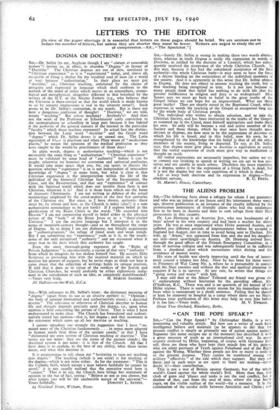SIR,—With reference to Dr. Selbie's letter : the dictionary meaning
of " dogma " (apart from its use as an abusive epithet) is: " Opinion ; the body of opinion formulated and authoritatively stated ; a doctrinal system." The relevance or otherwise of Christian doctrine to human life and thought depends precisely upon the dogma, i.e., upon what opinion is held concerning the person of Christ. That is what I have endeavoured to make clear. The Church has formulated and authori- tatively stated her opinion—that is, her dogma ; and that statement is the statement which sums up .all her doctrine or teaching.
I cannot repudiate too strongly the suggestion that I have " re- stated some of the Christian fundamentals . . . in terms more adapted to human needs than those of the ancient creeds," or that I have " elaborated my own system of Christian teaching or doctrine." The terms are not mine: they are the terms of the ancient creeds ; the doctrinal system is not mine: it is that of the Church. All that I have done is to explain, to the best of my ability, what those terms mean, and what that doctrine is.
It is preposterous to talk about my " hesitating to turn my teaching into dogma." The teaching (which is not mine) is the teaching of the dogma—which is not mine either. As for the statement: " This is the Catholic faith, which except a man believe faithfully he cannot be saved," it is not usually realised that the operative word here is " cannot." That is to say, the Church here brings her statement of opinion to the bar of fact, saying: "Believe or not as you choose, but what judges you will be the unalterable nature of the universe."—
Yours faithfully, DOROTHY L. SAYERS. 24 Newland Street, Witham, Essex.


































 Previous page
Previous page